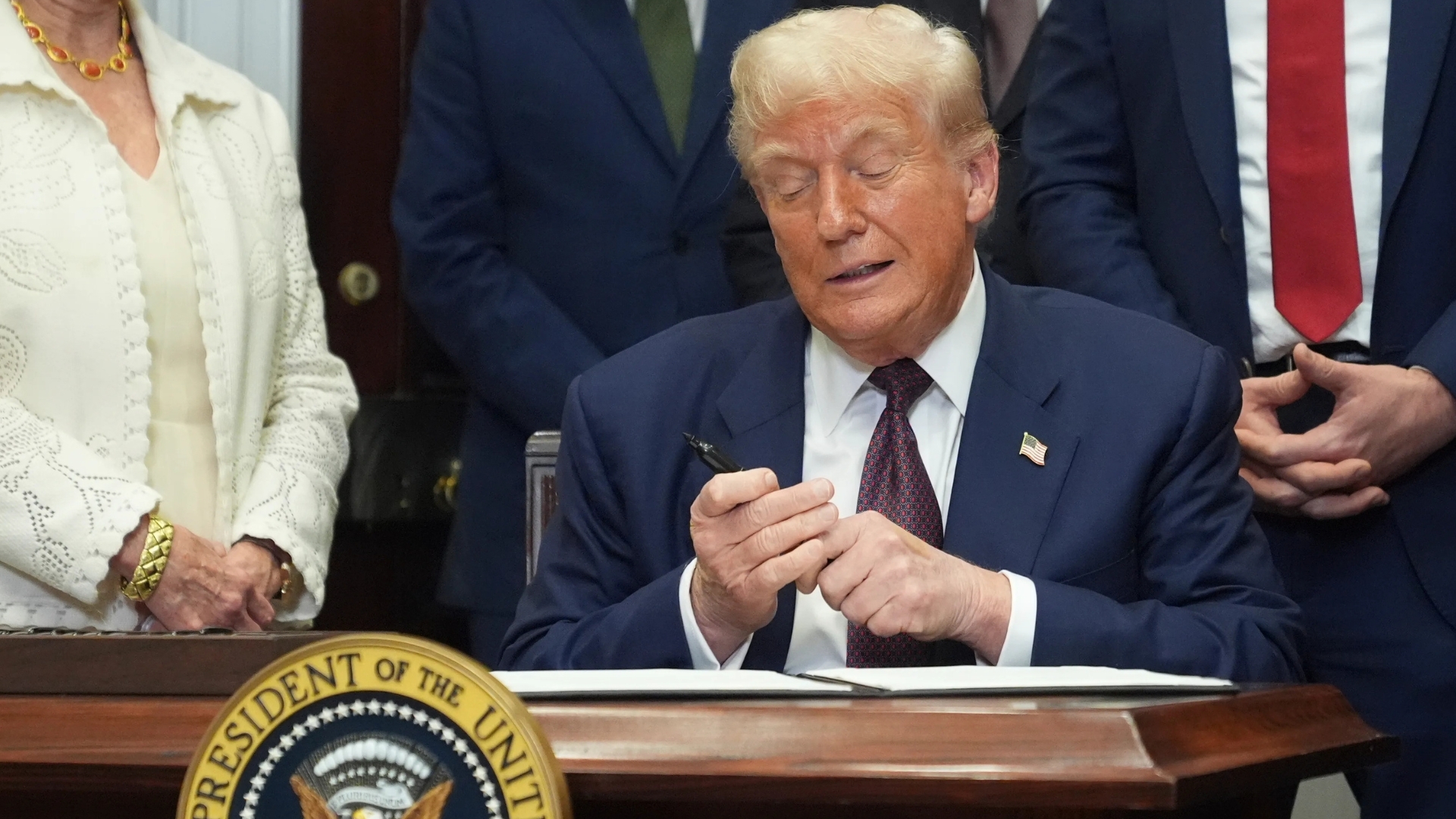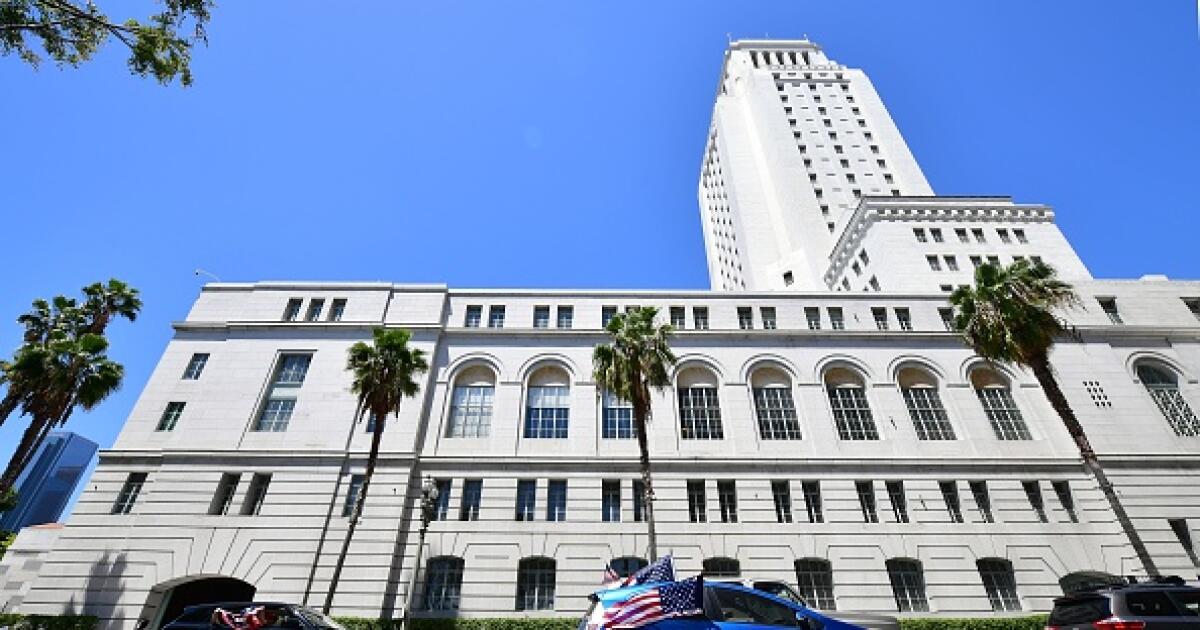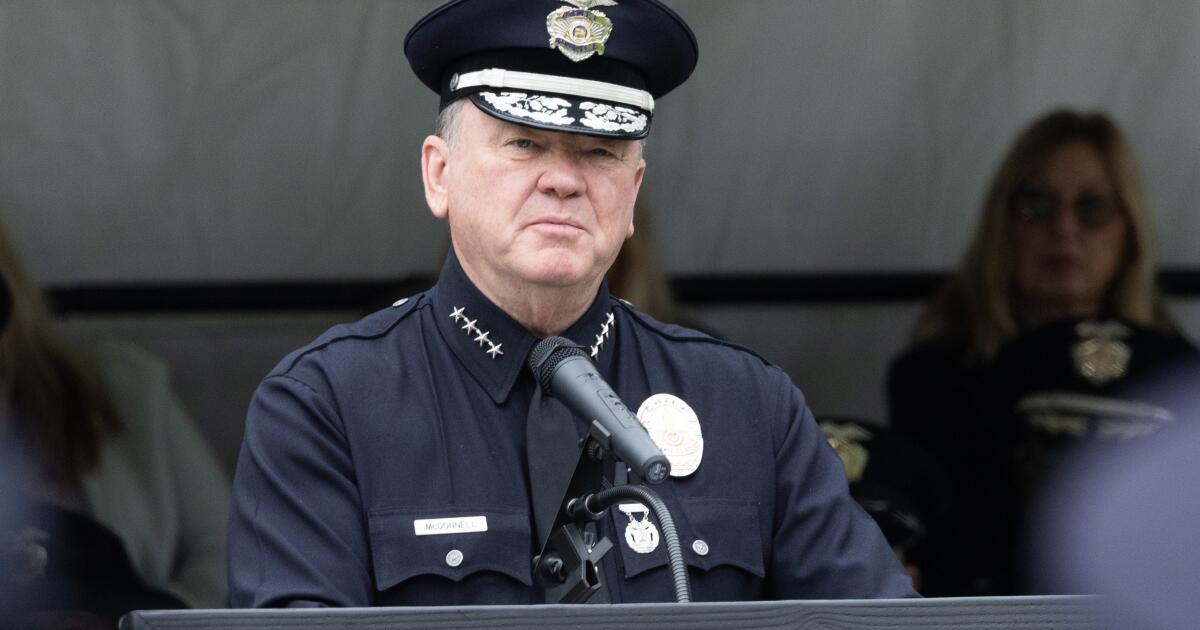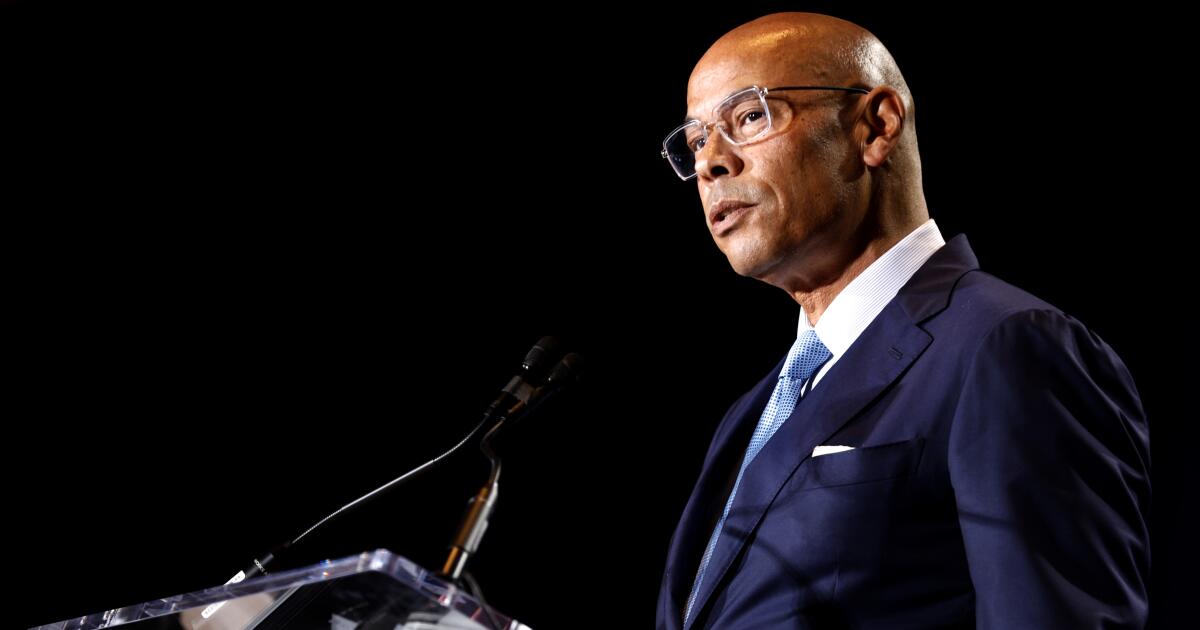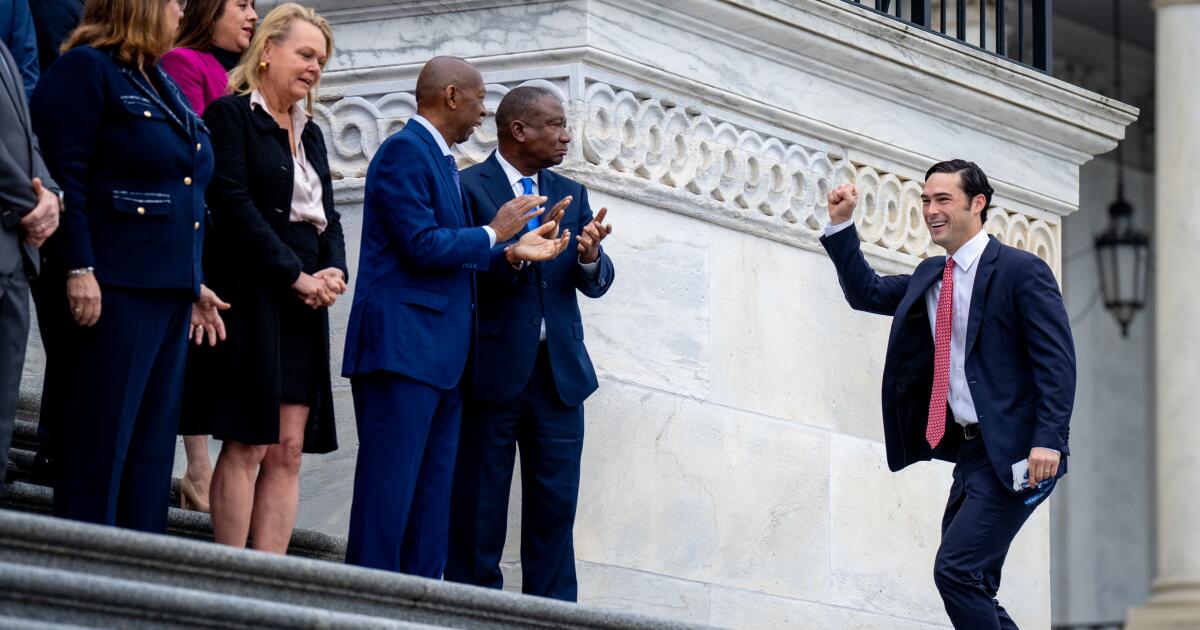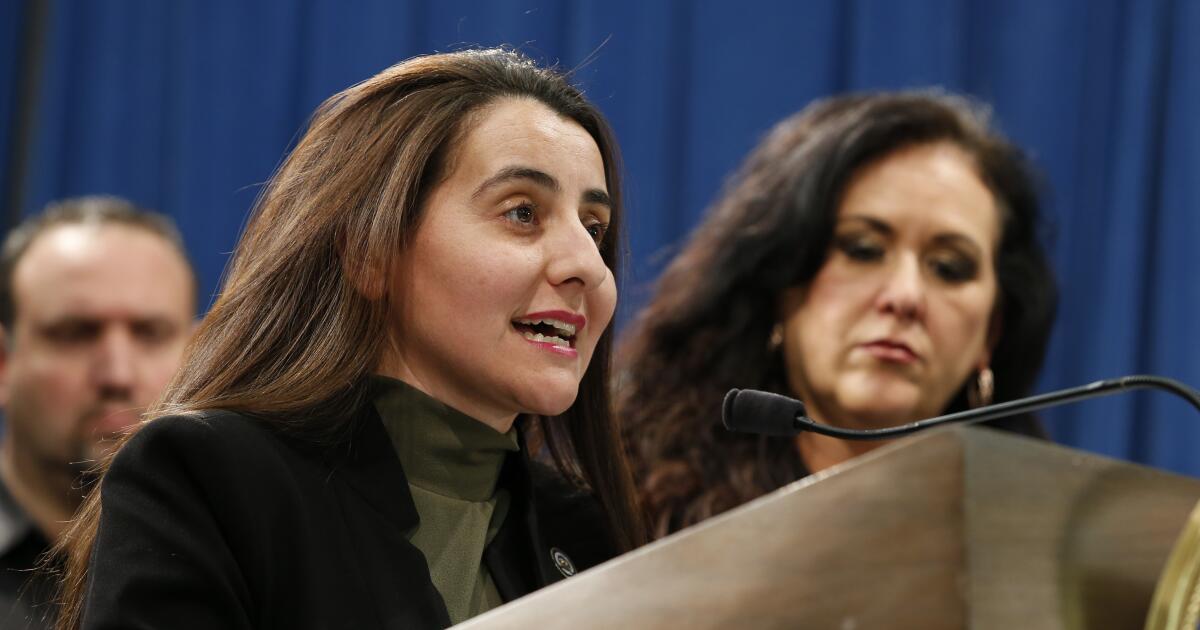Kerry Promises Trust, Strength, Leadership
BOSTON — Casting his life as an embodiment of the nation’s patriotism and principles, Sen. John F. Kerry vowed Thursday night to rebuild alliances and restore “trust and credibility to the White House” as he concluded the Democratic National Convention with a sweeping account of his personal story.
Seconds into his 45-minute speech, Kerry summed up the theme of the four-day event and the message he planned to carry into the fall campaign against President Bush.
“We’re here tonight united in one purpose,” he said, speaking in a hometown convention hall awash in red, white and blue. “To make America stronger at home and respected in the world.”
Questioning the strength of the economy, Kerry said, “We can do better, and we will.” Addressing terrorists around the world, he said, “You will lose and we will win.”
The senator from Massachusetts, unfamiliar to millions of voters despite more than two years of steady campaigning, had the challenge of delivering the most important speech of his 22-year political career. While polls have showed many voters are dissatisfied with Bush, many are not yet convinced of Kerry’s ability to lead the nation.
His closing speech to the convention and the roof-shaking response sent the nominee off to a battle against Bush that polls indicated had been a virtual dead heat for months.
Kerry and his running mate, North Carolina Sen. John Edwards, are to set out today on a two-week, cross-country campaign swing that takes them through 21 states via plane, train, bus and boat.
After spending the week out of sight at his Texas ranch, Bush plans to resume his campaign today with a bus tour through four swing states, and Vice President Dick Cheney is to continue his campaigning in the West.
Kerry, working his way through a text he spent weeks drafting in longhand, stirred the 4,000-plus convention delegates with an address that was poetic in parts and blunt in others, broad in biography but stinting in policy details.
“I will be a commander in chief who will never mislead us into war,” Kerry said, reminding the audience of his military experience in Vietnam. “I will have a vice president who will not conduct secret meetings with polluters to rewrite our environmental laws. I will have a secretary of defense who will listen to the best advice of the military leaders. And will appoint an attorney general who will uphold the Constitution of the United States.”
On a night that bristled with martial talk and patriotic imagery, Kerry also sought to seize back the symbolism of the Stars and Stripes, which Republicans captured as their political totem in the 1988 presidential campaign, when they used patriotism as an issue to defeat the last Democratic nominee from Massachusetts, former Gov. Michael S. Dukakis.
Kerry pointed to a huge American flag painted overhead, and recalled the one that flew tattered from the gun turret on his aluminum Swift boat in Vietnam. “That flag doesn’t belong to any president,” Kerry said to roars, which turned to chants of “U.S.A! U.S.A!”
“It doesn’t belong to any ideology,” Kerry shouted. “It doesn’t belong to any party. It belongs to all the American people.” Conjuring memories of World War II, the Cold War and the civil rights movement — epochal events that have shaped the country, — Kerry said: “We have it in our power to change the world again. But only if we are true to our ideals — and that starts by telling the truth to the American people.”
Turning around a line from Bush’s 2000 campaign, Kerry continued, “That is my first pledge to you tonight: As president, I will restore trust and credibility to the White House.”
The response was ear-splitting inside the FleetCenter arena, just a few miles from Kerry’s residence on elegant Beacon Hill. People hollered as they filled the aisles to capacity, perched on ledges, hung over railings and sat on the floor of balconies, their legs dangling over the edge. Outside, hundreds more were turned away under the fire marshal’s order.
Kerry’s speech was intended to be more personal than policy-oriented, reflecting a strategic sense that it was most important for voters to develop a gut-level sense of the Democratic nominee.
So even as he mentioned his proposals for job creation, pledged to expand the availability of healthcare and promised a middle-class tax cut, the address broke no new policy ground.
Instead, Kerry sought to wrap his principles in a narrative of his 60 years.
He spoke of his decorated military service as a Navy lieutenant in the Vietnam War. “I know what kids go through when they are carrying an M-16 in a dangerous place and they can’t tell friend from foe,” he said.
“I know what they go through when they’re on patrol at night and they don’t know what’s coming around the next bend. I know what it’s like to write letters home telling your family everything’s all right when you’re just not sure that that’s true.”
As president, he said, he would put into practice the lessons he learned from that unpopular war. “Before you go to battle, you have to be able to look a parent in the eye and truthfully say, ‘I tried everything possible to avoid sending your son or daughter into harm’s way.’ ”
Kerry cracked the book on earlier chapters in his life, speaking of his parents, the Cub Scouts and “my first model airplane, my first baseball mitt and my first bicycle.”
“What I learned has stayed with me for a lifetime,” he said of living in occupied Berlin, where his father worked in the Foreign Service. “I saw the gratitude of people toward the United States for what we have done … I learned what it meant to be America at our best. I learned the pride of our freedom. And I am determined now to restore that pride to all who look to America.”
He was vague about Iraq, reflecting the political bind he faced. Kerry voted to support the March 2003 invasion, which many Democrats opposed. Since then he has criticized Bush’s conduct of the war.
Kerry reiterated his call to reduce the U.S. cost in lives and aid by enlisting help from the country’s allies, but he said that could never come about under Bush.
“That won’t happen until we have a president who restores America’s respect and leadership so we don’t have to go it alone in the world,” Kerry said. “And we need to rebuild our alliances so we can get the terrorists before they get us.”
Much of the speech was an effort to turn away the criticisms that Republicans had leveled in tens of millions of dollars in advertising since Kerry clinched the Democratic nomination in March — that he was outside the mainstream, flip-flopped on issues and lacked the toughness to be commander in chief.
Latching on to a phrase often used by Bush and Cheney, Kerry sought to define “family values” in terms of economic stability.
“We value jobs where, when you put in a week’s work, you can actually pay your bills, provide for your children, lift up the quality of your life,” Kerry said. “We value an America where the middle class is not being squeezed, but doing better.”
Kerry said he would repeal the Bush tax cuts for individuals making more than $200,000 a year, “so we can invest in healthcare, education and job creation.”
He pledged to close the tax loopholes that reward companies for shipping jobs overseas, and vowed to cut the federal deficit in half in four years by imposing a “pay-as-you-go” system of federal budgeting.
He promised he would not raise taxes on middle-class Americans, calling that a false charge put out by Republicans. “Let me say straight out what I will do as president: I will cut middle-class taxes. I will reduce the burden on small businesses.”
Other issues such as healthcare and energy received passing mention. Kerry drew one of his biggest ovations by declaring: “I want an America that relies on its own ingenuity and innovation — not the Saudi royal family.”
Kerry has made energy independence a central part of his domestic platform, calling for promotion of alternative and renewable energy sources so that by 2020, Americans would be getting 20% of their electricity from those fuels. He also has proposed a $20-billion fund to research new forms of energy.
Kerry presented vague details of his healthcare plan. He said it would allow Americans to import cheaper prescription drugs from Canada and allow them to select their own doctors under any reform plan he approved.
Kerry has proposed extending coverage to almost three-fourths of uninsured Americans by allowing the working poor to obtain insurance through the existing federal-state partnership that covers children in their families. He would also seek to reduce insurance premiums for those with insurance by having the federal government assume the cost of the most expensive cases.
On foreign policy, Kerry pledged to wage war only as a last resort. But he said, “Let there be no mistake: I will never hesitate to use force when it is required. Any attack will be met with a swift and a certain response. I never will never give any nation or any institution a veto over our national security. And I will build a stronger American military.”
He acknowledged those who had criticized him “for seeing complexities.”
“And I do,” he said. “Because some issues just aren’t all that simple.”
Swiping at Bush, Kerry went on: “Saying there are weapons of mass destruction in Iraq doesn’t make it so. Saying we can fight a war on the cheap doesn’t make it so. And proclaiming ‘mission accomplished’ certainly doesn’t make it so.”’
As president, Kerry said, he would “not evade or equivocate,” but would immediately adopt the recommendations of the 9/11 commission to revamp the nation’s foreign policy and restructure its intelligence services.
Even before Kerry spoke, the last night of the Democrats’ four-day gathering included some of the convention’s most pointed attacks on Bush’s handling of terrorism and the war in Iraq. One after another, speakers tore into the president’s credibility and blamed him for souring relations with U.S. allies.
“Because we waged the war in Iraq virtually alone, we are responsible for the aftermath virtually alone,” said Sen. Joseph R. Biden Jr. of Delaware, who is one of Kerry’s closest foreign policy advisors. “And the price is clear: Nearly 90 percent of the troops and the casualties are American. And because the intelligence was hyped to justify going to war, America’s credibility and security have suffered a terrible blow.”
In one of the few departures from the week’s script, home-state Rep. Barney Frank delivered an impassioned defense of gay marriage.
“It is the Democratic Party — as opposed to our very right-wing Republican opponents — who support that agenda … of allowing us to marry, of allowing us to go forward as human beings with the rights of everyone else,” said Frank, who is openly gay and went beyond remarks vetted by the Kerry campaign.
The Massachusetts congressman, however, was consigned to an early speaking slot, well before the national television networks tuned in for Kerry’s speech.
The convention ended on the positive note Kerry had promised. He challenged Bush to join him in waging their campaigns as “optimists, not just opponents.”
Invoking the nation’s spirit of discovery — the first flight at Kitty Hawk, man’s mission to the moon, the invention of the computer chip — Kerry put forth a lyrical challenge: “What if?”
“What if we find a breakthrough to cure Parkinson’s, diabetes, Alzheimer’s and AIDS? What if we have a president who believes in science, so we can unleash the wonders of discovery like stem-cell research to treat illness and save millions of lives?
“What if we … make sure all our children are safe in the afternoons after school? And what if we have a leadership that’s as good as the American dream, so that bigotry and hatred never again steal the hope and future of any American?”
Times staff writers Michael Finnegan, Janet Hook, Maria L. La Ganga, Robert Schiff and Stephen W. Stromberg contributed to this report.
*
(BEGIN TEXT OF INFOBOX)
Politics vs. other stuff
Americans have more than politics on their minds these days. The top five Yahoo searches so far this week: Tour de France, Maria Sharapova, right, Britney Spears, NASCAR, and Usher. (The political satire Web cartoon at JibJab.com that lampoons President Bush and Sen. John F. Kerry was No. 6, but the real Kerry and the Democrats didn’t crack the top 15.)
Source: Yahoo
*
Convening on a budget
Although convention costs had risen steadily since 1984 as both parties’ political fests grew more elaborate, this year the Democrats reversed the trend. Their convention costs:
1984: $18.1 million
1988: $26.7 million
1992: $38.3 million
1996: $47.4 million
2000: $85.4 million
2004: $64.4 million
SOURCE: Campaign Finance Institute
*
Safety team
Securing the convention involved no fewer than 27 agencies. In addition to biggies such as the Boston police and the Secret Service, those keeping politicians and others safe included: Massachusetts Turnpike Authority; North American Aerospace Defense Command; U.S. Environmental Protection Agency; U.S. Northern Command; Massachusetts Executive Office of Transportation and Construction.
SOURCE: United States Secret Service
*
History on the block
Scores of vintage convention items have been put up for auction on EBay. Among them:
* A Georgia state seal from the 1912 Democratic National Convention, at $1,999.99
* A 2000 tambourine, right, that reads “Tipper Rocks,” at $9.99
* $3,000 worth of domain names in the event of a second vote recount, including UncountedVote.com
*
Secret Service’s secret out
Kerry and Edwards enjoy at least one trapping of the presidency and vice presidency — Secret Service protection and cool code names.
John Kerry Minuteman
John Edwards Speedway
Teresa Heinz Kerry Mahogany
SOURCE: National Journal
*
Plugged In
The Democratic National Convention website has turned into a virtual hot spot. Dems2004.org has received 50 million hits during the convention this week — more Monday and Tuesday alone than during the entire 2000 event in Los Angeles. There were 341,700 requests for live video streams in the 24-hour period after Sen. John Edwards’ speech.
SOURCE: Democratic National Convention Committee
*
Eventually, Nov. 2
The Democratic National Convention has come and gone. The GOP’s is just weeks away — from Aug. 30 to Sept. 2 in New York City. After that, debates will await:
Kerry vs. Bush: Sept. 30 in Miami;
Oct. 8 in St. Louis; Oct. 13 in Tempe, Ariz.
Edwards vs. Cheney: Oct. 5 in Cleveland
*
A TALE OF RESCUE
“The hamster was never quite right after that.”
ALEXANDRA KERRY
Telling the Democratic National Convention about how her father, Sen. John F. Kerry, did CPR on a family pet that had fallen overboard.

